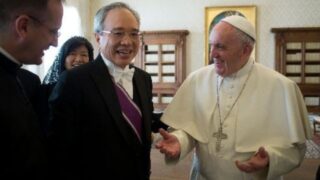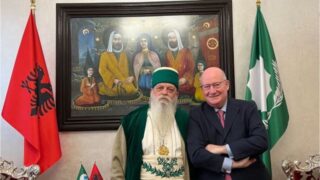The Court ruled in favor of three Bulgarian Evangelical churches, and said its case law has “evolved” since it refused to censor two French report on “cults” in 2001.
by Massimo Introvigne


Can a government call a minority religion a “cult” in its official documents? Or “secte,” a French expression that should be translated in English as “cult” rather than as “sect,” just as parallel words in many other languages derived from the Latin “secta”? No, said the European Court of Human Rights (ECHR) on December 13 in the case of “Tonchev and Others v. Bulgaria.”
The question has a history at the ECHR, marked by two old decisions of 2001 and 2008, which seemed to have solved the question in favor of the governments that use such language. In 2001, the ECHR declared inadmissible an application by the French Jehovah’s Witnesses, who had complained about having been called a “cult” (secte) in two French parliamentary reports of 1995 and 1999. In fact, the ECHR examined only the 1999 report, not the one of 1995 and its notorious “list of cults,” since in respect to the latter it concluded that the Jehovah’s Witnesses had filed their complaint too late. Rather than examining substantially the question of the term “cult” (secte), the ECHR based its decision on the fact that “a parliamentary report has no legal effect and cannot serve as the basis for any criminal or administrative proceedings.” Should they feel discriminate in such proceedings, the French Jehovah’s Witnesses were invited to file separate actions—which they did, eventually winning a landmark case against France about their taxes in 2011.
In 2008, in “Leela Förderkreis e.V. and Others v. Germany” the ECHR ruled against groups based on the teachings of “Osho” Rajneesh that had been called “destructive” “cults” (sekten) in reports by different German authorities. Unlike the 2001 decision on France, “Förderkreis” did pass judgement on whether the terms used by the government put the religious liberty of the Osho devotees in danger. The ECHR stated that “the terms used to describe the applicant associations’ movement may have had negative consequences for them. Without ascertaining the exact extent and nature of such consequences, the Court proceeds on the assumption that the Government’s statements in issue constituted an interference with the applicant associations’ right to manifest their religion or belief, as guaranteed by Article 9 § 1 of the [European] Convention [on Human Rights.]”
However, the ECHR found that in the specific case the use of the terms “cult” (sekte) and similar, while inappropriate, was justified by provisions existing in the German law at that time that were not prima facie illegitimate. But the ECHR also said that the fact that “the [German] Government undisputedly refrained from further using the term ‘sekte’ in their information campaign following the recommendation contained in the expert report on ‘so-called sects and psycho-cults’ issued in 1998” carried a weight in its decision.
However, in 2021, in the case “Centre of Societies for Krishna Consciousness In Russia and Frolov v. Russia,” the ECHR ruled against a Russian brochure that had called the ISKCON, popularly known as the Hare Krishna movement, a “totalitarian cult” and a “destructive cult,” and concluded that “by using derogatory language and unsubstantiated allegations for describing the applicant centre’s religious beliefs” the Russian government had violated ISKCON’s freedom of religion.


On December 13, 2022, the ECHR decided the case “Tonchev and Others v. Bulgaria,” resulting from the complaints of three Evangelical and Pentecostal churches from the Bulgarian city of Burgas, the Unified Bulgarian Good News Church, the First Congregational Evangelical Church, and the Evangelical Pentecostal Church Philadelphia. Together with the Jehovah’s Witnesses and the Church of Jesus Christ of Latter-day Saints, popularly known as the “Mormon” Church, they had been targeted in 2008 by a letter sent to all public schools by the City of Burgas. The letter asked the schools to explain to all pupils that the groups mentioned in the text were “cults” (секти, sekti), should not be confused with the legitimate Bulgarian Orthodox Church, were “dangerous,” and exposed their members to “mental health problems.”
In its defense, the Bulgarian government insisted on the ECHR 2001 decision on the French reports, and claimed that no negative consequences had affected the three Evangelical churches because of the letter. It also pretended that “sekti” in Bulgarian had no negative connotations, an argument the ECHR failed to consider.


Quoting the 2021 decision about the Russian Hare Krishna, the ECHR answered that “its case law subsequent to the above-mentioned [2001] decision ‘Fédération chrétienne des témoins de Jéhovah de France’ decision marks an evolution on the question of whether the use of disqualifying terms with regard to a religious community can be analyzed as an infringement of the rights guaranteed by Article 9 of the Convention.” More recently, “the Court has considered that the use of hostile or derogatory terms in referring to a religious community in documents issued by public authorities, insofar as it is likely to have negative consequences on the exercise by its members of their freedom of religion, is sufficient to constitute an infringement of the rights guaranteed by Article 9 of the Convention.”
In the specific case of Burgas, “the Court considers that the terms used in the circular letter and the information note of 9 April 2008, which described certain religious currents, including Evangelicalism to which the applicant associations belonged, as ‘dangerous religious cults’ that ‘contravene Bulgarian legislation, citizens’ rights and public order’ and whose meetings expose their participants to ‘psychological disorders,’ may indeed be perceived as pejorative and hostile. It notes that the documents in question were distributed by the town hall of Burgas, the town in which the applicant associations and pastors were operating, to all the schools in the town, which were invited to bring them to the attention of the pupils and to report on the way in which the information was presented and the way in which the children reacted. In these circumstances, and even if the measures complained of did not directly restrict the right of the applicant pastors or their co-religionists to manifest their religion through worship and practice, the Court considers, in the light of its case law, that these measures may have had negative repercussions on the exercise of religious freedom by the members of the churches in question.”


After “Tonchev,” it would become more difficult for governments to rely on the old 2001 decision about the French reports. “Tonchev” has now established that calling a religious minority a “cult” exposes it to negative consequences, and such slanderous language should be avoided by public authorities.









